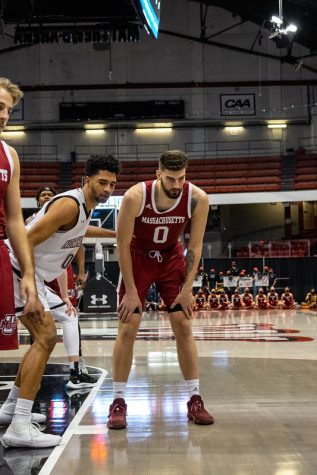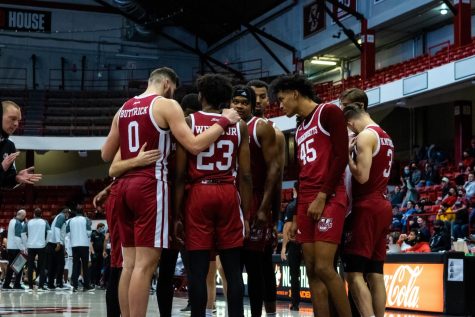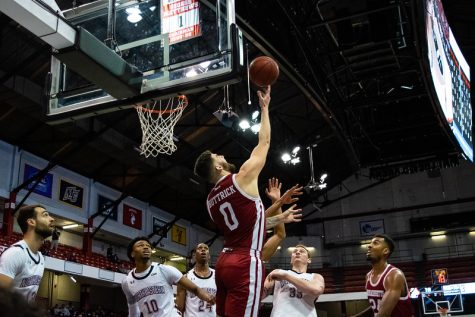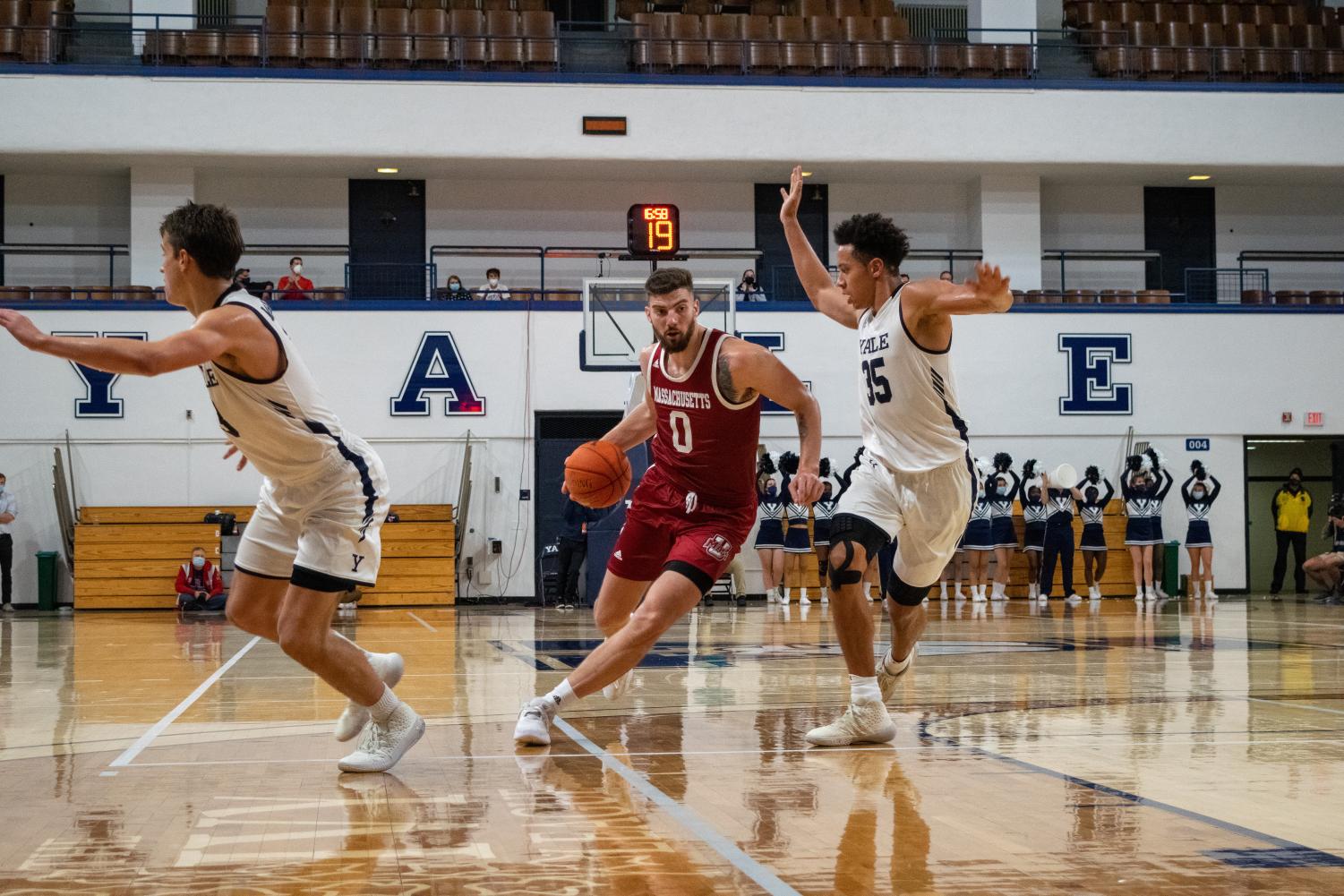Freed from the cage of broken promises: Trent Buttrick finally got what he wanted
Trent Buttrick got ‘What I always wanted’ at UMass after difficult times at Penn State
March 9, 2022
Depending on what he was in the mood for that night, Trent Buttrick would dine at either Applebee’s, TGI Friday’s or Chipotle, his go-to places to eat. It wasn’t the most uncommon thing for him to go out alone, but during this time — a two-week span in December of his junior season at Penn State — it was all he did.
The desire to not be around anyone took control. After dinner Buttrick sat in his room playing Fortnite, Apex Legends and Call of Duty until 3 a.m. The hours alone in his apartment room piled up. He did anything he could to take his mind off what was — or wasn’t — happening on the basketball court.
This wasn’t the Trent Buttrick that Trent Buttrick was used to.
The move from the small town of Bloomsburg, PA to Naples, FL ahead of Buttrick’s senior year of high school aimed to help him get more recognition from basketball programs. While Naples is no hotbed for high-level basketball recruits, it’s night and day to what Bloomsburg would do for him.
Offers from the Air Force Academy and UNC Charlotte were appreciated, but Buttrick wanted better for himself. As a Pennsylvania kid, his dream was to attend Penn State, but that didn’t feel realistic with only two Division-I offers on the table.

Luckily for Trent, his brother Christian tried out as a walk-on his senior year at Penn State in 2014. He didn’t make the team, but he made a connection with Dwayne Anderson, an assistant coach under Pat Chambers, the Nittany Lions’ head basketball coach.
Christian reached out years later with Trent’s highlights, and it worked. A few weeks later Anderson met with Trent, who was so awestruck that he forgot what Anderson said during their conversation. In February of his senior season, Buttrick received an offer from Chambers and Penn State, where he would go on to be a part of its basketball team for the next four seasons.
Notice the missing word: play.
Chambers told his father, Tony Buttrick that he views his son as a captain someday, but Tony quickly understood a college coach’s desire to appease the recruit’s parents.
“They make promises to parents every year to get their kids to come there,” Tony said. “And I get it, it’s competitive. It’s a brutal business and it’s big money in the Big Ten.”
“Whoever gets the latest promise are the ones that get to play.”
Buttrick didn’t expect to play much his freshman year, admitting that he wasn’t ready to play in the Big Ten. His role increased his sophomore year, specifically after he shot 5-of-5 from the field and 3-of-3 on his 3-pointers to finish with 13 points in a breakout game against Alabama. He started the next two games, then didn’t log double digit minutes for the remainder of the season.
After learning the Nittany Lions star forward Lamar Stevens was returning for his senior year, Buttrick considered the transfer portal due to his lack of a role in the program. A couple months after his sophomore season ended, Buttrick and Chambers met for breakfast to discuss his future.
Buttrick told him that he wanted to play more and start as well. Chambers told him he would slide people around so Buttrick could play at power forward — his natural position — rather than center. Chambers said that Penn State would play a lineup that included both him and Lamar Stevens, along with a center for a bigger lineup.
Suddenly Buttrick felt great about his situation. Having two years left in a big role with a Power-5 program excited him.
After playing 15 minutes in a blowout win during the first game of his junior season, Buttrick didn’t play more than nine minutes in any other game that year. It became dark. Extra hours of practice and training in the gym, dating back to the summer before the season, was for nothing. He couldn’t make a case for his playing time either because the Nittany Lions were a top five team in the Big Ten.
Seth Lundy — a freshman forward for Penn State at the time — played the minutes Buttrick thought he would get. Even Lundy was surprised, telling Buttrick he didn’t agree with the decision and that Buttrick deserved the minutes instead.
“Initially I was pissed off because I thought it was b******t,” Buttrick said. “I respected [Lundy] for telling me that.”
“It’s tough, but it is what it is at this point.”
John Harrar was another big man on Penn State who came in the same year as Buttrick. The two eventually became best friends, living in an apartment together their junior year. At times, that apartment served as the battleground for fist fights between them. Buttrick got jealous of Harrar’s success. He had a consistent role with consistent minutes, and Buttrick wanted that.
Buttrick would make fun of Harrar, tempers built up and they’d go at it. There was never serious damage, a bloody nose here and there were the only marks from their exchanges. Less than 10 minutes later, the two would hug it out.
“[Harrar] was pretty much like a brother to me,” Buttrick said. “Me and my brothers growing up, we always fought a lot. That’s just how I am. It’s just testing each other to see if [one of us will] back down … I looked at him and felt like we could [fight] and we always made up and never hated each other.”
Everything culminated to create that two-week span in early December. Buttrick played zero minutes in back-to-back games against Ole Miss and Syracuse in late November, and that was the final straw. Buttrick stopped working out and putting in extra time after practice. He didn’t see the point. He knew he wasn’t going to play anyways.
“Dude, this isn’t getting me anywhere,” Buttrick said.
Buttrick eventually snapped out of his funk. Penn State was 6-1 at the time, and one of the best teams in the Big Ten. Any chance of being a part of that was a massive opportunity. He also talked to his father who told Buttrick to take the high road, and cheer for others success when he isn’t having any of his own.
“I’d definitely say [my dad] played a pretty big role,” Buttrick said about getting back to working hard again. “He definitely helped me try to become a better leader. Even though I wasn’t playing, just try to be the best person I could be and help our team in whatever aspect that was.”
There were plenty of times when he thought about throwing the towel in, not putting in as much work as he had since he stepped foot on Penn State’s campus. But Buttrick didn’t know how to stop. As much as he wanted to, it wasn’t something he’d ever done, and he didn’t want this to be his first time.
“[Trent’s response to adversity is] the thing I’m most proud of,” Tony said. “Trent took that advice and took the high road and did not become bitter. He didn’t like it, but he didn’t become bitter, and he worked and he worked.”
Going back to his usual grind didn’t help him that season, and Buttrick didn’t want to transfer and sit out a year before playing again. Chambers was fired right before the beginning of his senior year, and Buttrick only averaged about 13 minutes and three points under interim head coach Jim Ferry.
COVID-19 gave Buttrick an extra year of eligibility, which wouldn’t have to come a year later if he decided to transfer. Buttrick capitalized on that opportunity. To his surprise, 15-20 schools reached out to recruit him within the first couple weeks, including Power-5 schools such as Iowa and Virginia. Of the 15-20 schools that reached out, Massachusetts head coach Matt McCall was the only head coach that directly called Buttrick.
“That really stuck out to me,” Buttrick said. “That really stands out in recruiting and shows that they really want you.”

McCall told Buttrick everything he wanted to hear: he will be a very important part of the team and he would play the four, which he didn’t get to do at Penn State.
“I basically felt the most trust in McCall and [the UMass] coaching staff more than I did in anybody else,” Buttrick said. “I just felt comfortable coming here.”
After Buttrick committed in April, McCall traveled down to Florida in the summer to watch him workout. His work ethic was on full display. McCall saw the extra hours that Buttrick put in and appreciated that, noting it as one of his best attributes.
It was a transformative summer for a player who was never supposed to do more than shoot 3-pointers and play defense. He couldn’t do drills to help his dribbling, post work or virtually anything but shooting 3-pointers when coaches were watching at Penn State. He was given the freedom to expand his game in every way with the Minutemen. Buttrick also had to adjust his pass-first mindset and know that he could try and score the ball if the opportunity was given.
Buttrick had to get comfortable with being free.
“It was kind of like I was being let out of a cage for the first time,” Buttrick said.
Former assistant Brian Grossman would be in the gym with Buttrick at 7:30 a.m. helping him work to improve his game. When Grossman left the program, Buttrick looked to other assistants or even McCall to come with him early in the morning and train, using whoever he could to get extra work in.
“It was almost to the point where you’re like ‘Hey man you got to back off a little bit here,’” McCall said. “[Along with his workouts], we’re going two hours in practice.”
The season-opener came against UMBC, Buttrick had one first half point and was 0-for-3 from the 3-point line. He was getting outclassed by Retrievers big man Dimitrije Spasojevic, who finished the first half with 10 points and eight rebounds. Tony saw his son trying to process an entirely new environment and knew that Trent wasn’t comfortable yet.
The damage that Spasojevic was inflicting on UMass forced McCall to bench Buttrick to start the second half.
“F*** that,” Buttrick said.
The last four years of Buttrick sitting on the bench flashed in his mind. He refused to relive the experience that led to his transfer in the first place.
With 13 minutes left in the game and the Minutemen up five, Buttrick was subbed in. UMass would go on to eventually win by 17 points. Buttrick finished with 16 points, going 3-of-5 from three in the second half. Spasojevic finished the game with 10 points and nine rebounds.
The leadup to the Penn State game was an important one for not only Trent, but the entire Buttrick family. Over a dozen of his family members made the trip up to Amherst to watch him play against his former team.
Both his dad and McCall made sure to tell Buttrick not to put too much pressure on himself or get too emotional, but he couldn’t help to take it a little personally after everything the program put him through. Regardless of the new coaching staff, a fire lit in Buttrick’s eyes when he saw the navy blue Nittany Lions jerseys across from him.
He was also on a different team than Harrar for the first time in his collegiate career. Harrar and Buttrick conversed during the first half, enjoying the moment of playing against their best friend. Though he didn’t have a bad first half, Buttrick only had three points. The playful talk quickly turned into intense trash talk, which Harrar had no answers for.
Buttrick finished with a career-high 19 points, along with nine rebounds, six assists, three steals and two blocks in the 81-56 win.
“He had six assists?” Harrar said as Buttrick’s stat line was repeated to him. “God damn.”
“This is my moment, and nobody was going to take that moment from me,” Buttrick said. “So, I went and took that moment.”
A backpack of burden came off Buttrick’s back after the career night, using the performance against a Big Ten team as a confidence booster for the next stretch of games. He averaged over 15 points in the first seven games of the season.
That hasn’t held up, however. Buttrick is averaging 10.8 points per game heading into the Atlantic 10 conference tournament. Even though he hasn’t been as strong as he was to start the season, he’s averaging career highs in every statistical category and is the only player on UMass to start and play in all 30 games this season.
“I’ve had my ups and downs as an individual, we’ve had our ups and downs as a group,” Buttrick said. “I never experienced that as an individual on the court because I never played enough. I never went through the shooting struggles or the scoring struggles and the mental piece of the game that I never really had before because I never had to do it.”

The development in the past year far exceeded Buttrick’s development in his entire four years at Penn State. From talking and watching his brother in his time with the Nittany Lions, Christian believes that Chambers instilled “this fear and this hesitation in Trent that carried with him multiple seasons.” Nonetheless, Buttrick and his family don’t carry any ill-will towards his former head coach.
“I want to say that I hate him, but I don’t,” Buttrick said. “I still have love and respect for him because he was my coach for almost four years. I did learn a lot when I was there, and I grew up a lot when I was there and I have him to thank for that. I would just say I feel indifferent.”
It’s safe to say the season hasn’t been a success for the Minutemen. A 14-16 regular season record gives UMass the No. 10 seed in the A-10 tournament, and it will also be the final ride for McCall, who was fired on March 1. But the negative season doesn’t put a damper what Buttrick experienced during his time at UMass.
“This is the opportunity I always wanted,” Buttrick said. “I couldn’t have asked for anything more.”
Joey Aliberti can be reached at [email protected] and followed on Twitter @JosephAliberti1.

Melissa Hanna • Mar 9, 2022 at 3:50 pm
I enjoyed reading this as much as I enjoyed watching him play!
Anne-Marie B • Mar 9, 2022 at 12:34 pm
Wonderful writing and prose and about a lovely young man. We are very proud of him
Barry Jaye • Mar 10, 2022 at 8:47 pm
Glad to have met you and Trent in St. Pete. Trent is a great young man that will have a terrific future in whatever he does after graduation. And what a wonderful player for UMass. A double double tonite versus GW.
One of my all time favorite players in the 60 years I have been watching Umass basketball.